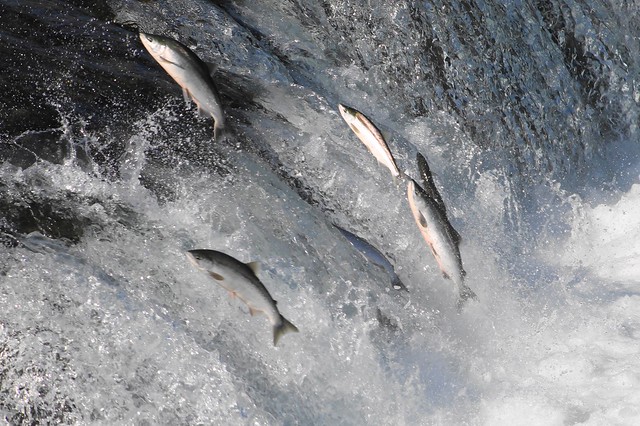Words for spring, fountain, well and related things in Celtic languages.
Words marked with an * are reconstructions.
| Old Irish (Goídelc) | topur, topar [ˈto.bər] = source, well, spring tipra = fountain, spring, well |
|---|---|
| Middle Irish (Gaoidhealg) | topar, tobar, sopar = well, spring, baptismal font, source tipra, tiprait = fountain, spring, well, source |
| Irish (Gaeilge) | tobar [ˈt̪ˠɔbˠəɾˠ / ˈt̪ˠʌbˠəɾˠ] = well, fountain, spring, source |
| Scottish Gaelic (Gàidhlig) | tobar [tobər] = well, spring, source tobar na h-òige = the fountain of youth tobar-mhiann = wishing well tobar naomh = holy well tobar-sràide = hydrant |
| Manx (Gaelg) | tubbyr = font, fountain, laver tubbyr niaghan = washtub tubbyr oonlee = bathtub |
Etymology: from Proto-Celtic *ber- (to carry, bear), from Proto-Indo-European *bʰéreti (to be carrying), *bʰer- (to bear, carry) [source].
| Proto-Brythonic | *funtọn = spring, well, fountain |
|---|---|
| Old Welsh (Kembraec) | finnaun, fynnaun = spring, well, fountain |
| Middle Welsh (Kymraec) | ffynnawn, ffynnon = spring, well, fountain ffynnonell, ffynhonnel = source, spring, fount, origin, source fynhonic = small spring, source, issue fynonvs, ffynnhonvs, fynhonus = springing, welling, bubbling, gushing |
| Welsh (Cymraeg) | ffynnon [ˈfənɔn] = spring, well, fountain, source, origin, issue, gland ffynonellu = to spring, originate ffynhonni, ffynhonna = to well, spring, gush, visit a medicinal spring ffynhonnell = source, spring, fount, origin, (historical or literary) source ffynhonnol = original ffynhonnus = springing, welling, bubbling, gushing |
| Middle Cornish (Cernewec) | fenten, funten = well, fountain |
| Cornish (Kernewek) | fenten = fountain, well, spring |
| Old Breton (Brethonoc) | funton = fountain, spring, font |
| Middle Breton (Brezonec) | feunten = fountain, spring, font |
| Breton (Brezhoneg) | feunteun [ˈfœ̃ntœ̃n] = fountain, spring, font feunteunier = font maker |
Etymology: from Late Latin fontāna (spring, source, fountain), from Latin fons (spring, well, fountain, font, origin, source), from Proto-Italic *fontis (spring, well), from *θontis, possibly from Proto-Indo-European *dʰónh₂-ti-s, from *dʰenh₂- (to flow) [source]. Words from the same roots include font (a receptacle in a church for holy water, especially one used in baptism) in English, fonte (source, spring) in Italian, and fuente (spring, fountain, source, bowl) in Spanish [source].
| Welsh (Cymraeg) | (y)stifflog [əsˈtɪflɔɡ] = cuttlefish, squid ystiff(i)o = to scour, spurt, jet |
|---|---|
| Middle Cornish (Cernewec) | stifac = cuttlefish |
| Cornish (Kernewek) | stifek = squid stifella = to spray stifjyn = jet engine stiflinder = jet lag stifliv = jet stream stifya = to spray |
| Breton (Brezhoneg) | stivell [sti:vɛl] = fountain, gushing spring, water jet, wash house stivelleg = squid stivellat = to spring forth (by gushing out), to stick out one’s head |
Etymology (Breton): from stiv (spring, source, wash house), perhaps from Latin *stuba, from Proto-Germanic *stubō (room, heated room, living room), which is also the root of the English word stove [source].
Sources: Wiktionary, Etymological Dictionary Of Proto Celtic, In Dúil Bélrai English – Old Irish glossary, eDIL – Electronic Dictionary of the Irish Language, Teanglann.ie, Am Faclair Beag, An etymological dictionary of the Gaelic language, Fockleyreen: Manx – English Dictionary, Online Manx Dictionary, Gaelg Corpus, Geiriadur Prifysgol Cymru, Lexicon cornu-britannicum : a dictionary of the ancient Celtic language of Cornwall, Gerlyver Kernewek, Devri : Le dictionaire diachronique du breton, Geriafurch, TermOfis






